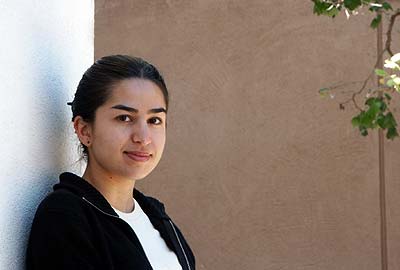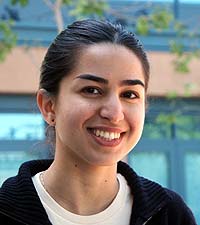 |
In addition to her work at Children's Hospital and the shelter, Anosheh Afghahi found time to tutor undergraduates in chemistry through the Academic Center. (BAP photos) |
Senior Anosheh Afghahi says her real education took place in the lab, homeless shelter, and sick children's ward
BERKELEY - Anosheh Afghahi, one of three runners-up for the 2003 University Medal, UC Berkeley's highest honor, sincerely believes there is nothing that distinguishes her from her peers. This senior's unusual background (her parents are Iranian, but she grew up in Sweden), her hematology research, and the hours she has spent volunteering at Children's Hospital and a local homeless shelter are really no big deal, she says.
University Medal coverage Full graduation coverage: |
"There are hundreds, if not thousands, of Berkeley students who dedicate their time to help others - and probably spend more time and are more dedicated than me - and conduct truly amazing research and do well in classes," she argues. "I don't feel like I should be singled out. I am just proud to be part of these amazing students."
Afghahi's modesty is familiar to her mentor, Caroline Kane, an adjunct professor of biochemistry & molecular biology, who describes her as a "quiet, powerful person." Afghahi has worked with Kane and others as a research assistant in Children's Hospital's Hematology Lab for the past two years. "Anosheh is self-effacing - during her first summer of research, she developed an assay that the lab now uses for its work," Kane says. "She has been investigating which proteins change the red blood cell surface to result in altered signaling to those cells from the serum. This may sound arcane, but it is directly significant in understanding how sickle cell patients enter crisis, and how they might respond to drugs designed to assist them in living pain-free lives."
Afghahi plans to work for a year before applying to medical school. Her desire to become a doctor represents not just a natural next step for a molecular and cell biology major, but the culmination of all Afghahi's various academic, research, and volunteer experiences. "People say college is about learning, but it's really about learning in all these different ways," she explains. Her advice to new students: "Don't limit your learning to your classes. Berkeley - both the city and the university - have so much to offer."
Clash of civilizations
One of the things Afghahi most appreciates about Berkeley (both of them) is its open-armed embrace of all cultures. She was born in England to two Persian engineers, moved to Iran as an infant, then to Sweden when she was two, during unrest in Iran. She grew up in Sweden until age 16, when the family emigrated to Arizona and shortly thereafter to Orange County, California. Although she began learning English in the fourth grade, she was so immersed in Swedish culture and language that she thought of herself as Swedish. "But now that I don't speak Swedish regularly - I speak Persian at home and English at school - I don't really feel Swedish anymore," she says. "I like that at Berkeley you don't have to have a fixed identity."
Afghahi first began thinking that she might want to become a doctor while a teenager in Sweden. There, it is common for high-school students to spend part of the school year interning in a profession that interests them. Afghahi shadowed hospital nurses and doctors for two full weeks as they ministered to diabetes and geriatric patients. She was hooked.
 Afghahi speaks fluent Persian, Swedish, and English, plus pretty good French. |
When she began looking for extracurricular activities in her third semester, Children's Hospital seemed a natural place to start. After volunteer orientation, she ended up in the inpatient ward, entertaining sick children in the playroom by day and reading books or playing games by their bedsides at night. There, she witnessed the daily struggles of children battling sickle cell anemia and other blood disorders. She learned more about childhood diseases and doctor-patient interaction in fall 2001, when she interned with a pediatrician who had a private clinic in Pinole, California.
Her experiences at Children's Hospital are what gave focus to her research work at the hospital's Hematology Lab, Afghahi says, and now she is considering pursuing a pediatrics-related specialty. "I want to go into something where I can be in touch with research, yet be on the clinical side, seeing patients," she explains.
One foot in front of the other
Afghahi is as modest about her public service as she is about her research. "Anosheh is committed to the health of the community - her time in volunteering is significant, but she will make a 'small' deal of it if you ask her about it," warns Kane, her mentor.
While in the middle of her two-year stint volunteering at Children's Hospital, in June 2001 Afghahi started working for the Suitcase Clinic at the Dwight Women's Shelter in Berkeley. Run by UC Berkeley undergraduates, the Suitcase Clinic offers free health care, medicine, vision screening, legal advice, and therapeutic services. At the shelter, Afghahi provides health and housing information to low-income and homeless women.
| 'I
have learned that there are so many factors that can make someone be homeless.
It is not up to us to judge.' -Anosheh Afghahi, Suitcase Clinic volunteer
|
"Basically, we help people do things that may seem routine to us but are not that obvious to them, like finding work, housing, and childcare," she explains. "Last week the other health/housing coordinator and I worked with a woman who had finally gotten housing after searching for eight months. We talked to her about how to approach the landlord confidently and assertively, and we're trying to find places that might donate furniture for her apartment."
Among the services the Suitcase Clinic provides is something wholly
unexpected: foot washing.
"Your feet are a big part of your overall health. If your feet are clean and you have good socks, you feel better," she says. "Among other things, many homeless people do not get much physical and emotional contact. Footwashing provides them with physical attention, and lets them to talk about their concerns in a comfortable and relaxed atmosphere."
Afghahi draws on her own experience about how foreign and difficult everything seemed when she arrived in the United States - "everyone spoke so quickly, I couldn't understand them" - to better understand the loneliness and isolation of the homeless women she meets. "My background is very different, yet I have discovered that we have many feelings in common," she writes in her application for the University Medal.
The contrast between Sweden, which has one of the best social-services infrastructures in the world - homeless people are rare in Sweden - and the teeming streets of Berkeley was at first a shock to Afghahi. She couldn't understand how this situation could exist. "I have learned that there are so many factors that can make someone be homeless," she says. "It is not up to us to judge."
Asked why she chooses to volunteer her time in such emotionally draining ways, Afghahi answers, "My motivation for going to the women's shelter is knowing that the information that I provide - even the hygiene products that I give out - can make an impact in someone's life." Then, she hedges: "But a volunteer is not simply providing a service. Depending on what the volunteer work is, it is not simply a one-way interaction with the clients or children. One volunteers to help but also to learn and to be part of something that is larger. In that sense, volunteering is a bit of a selfish act, since one is participating in something also to feel good about oneself."
Afghahi has something to teach all of us. Kane says it best: "Anosheh has splendid insight into science, but also splendid insight into society. Gently, she will be a positive force in the world."

